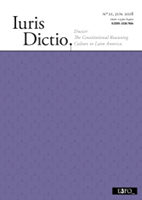What Makes a Good Lawyer? Was Magnaud indeed such a good lawyer?
DOI:
https://doi.org/10.18272/iu.v21i21.1135Abstract
The points presented in this document can be summarized as follows:
1. The jurist mentality is characterized by a peculiar argumentation technique that is in conflict with common sense. This is due to the fact that a jurist has to work with defined texts and concepts (or precedents) and solve various practical problems with a reference to them (rather than personal feelings, morality or efficiency).
2. Another typical quality is a practical procedural approach (e.g. auditur et altera pars). This goes back several generations of experience.
3. The most striking feature of a good jurist is dual-connectedness thinking. This requires a jurist to meet an internal (typically jurist's) standard of argumentation and an external evaluation standard. This external criterion means that a good lawyer must always take into account the interests/values at stake in the legal debate.
4. In general, the evaluation criterion does not normally appear explicitly in the argumentation, only between the lines and indirectly. Teleological argumentation may be, in special circumstances, the exception.
5. Magnaud, the famous French judge of the late nineteenth and early twentieth centuries, met the above criteria, so he was a really good jurist (or "good judge" as reflected in his epithet). 6. Depending on the concept of legal scholarship used, the above statements apply to works of legal scholarship only to a limited extent or do not apply at all.
Downloads
References
Béla, Pokol (2001). A jog elmélete [La Teoría del Derecho]. Budapest: Rejtjel.
Bourdieu, P. y Terdiman, R. (1987). fte Force of Law: Towards a Sociology of the Juridical Field. Hastings Law Journal, 5, 814-853.
Dworkin, R. (1986). Law"™s Empire. London: Fontana Press.
Gyekiczky, T (2003). A jogászok joga [El derecho de los juristas]. Budapest: Gondolat. Honoré, A. M. (1974). Legal Reasoning in Rome and Today. South African Law Journal, 91,
-94.
Jakab, A. (2003). A jogszabálytan fÅ‘bb kérdéseirÅ‘l [Sobre los problemas principales de actos normativos jurídicos]. Budapest: Unió.
"” (2005). Probleme der Stufenbaulehre. Archiv für Rechts- und Sozialphilosophie 3, 333-365.
"” (2007). What Makes a Good Lawyer? Was Magnaud indeed such a good lawyer? Zeitschrift für öffentliches Recht, 2, pp. 275-287.
Jakab, A. y Hollán, M. Die Hinterlassenschaft des Sozialismus im heutigen Recht: Das Beispiel Ungarn. Jahrbuch für Ostrecht, 11(1), 22-24.
Kelsen, H. (1960). Reine Rechtslehre. Wien: Deuticke.
Leyret (ed.) (1990). Las sentencias del Buen Juez Magnaud. Bogotá: Temis.
MacCormick, N. (ed.) (1991). Interpreting Statutes. A Comparative Study. Dartmouth: Aldershot E.A.
Mastronardi, P. A. (2001). Juristisches Denken. Bern: Haupt.
Nathanson, S. (1997): What Lawyers Do: A Problem-Solving Approach to Legal. London: Sweet & Maxwell.
Ott, E. E. (1995). Juristische Dialektik. Basel/Frankfurt: Helbing & Lichtenhahn. Perelman, C. (1976). Logique juridique nouvelle rhetórique. Paris: Dalloz.
Pound, R. (1921) The Spirit of the Common Law. Boston: Marshall Jones Company.
Röhl, K. y Röhl H. C. (2001). Allgemeine Rechtslehre. Ein Lehrbuch. Cologne: Carl Heymanns Verlag.
Rudden, B. Courts and Codes in England, France, and Russia. Tulane Law Review, 48, 1010- 1028.
Von Savigny, F.C. (1814). Vom Beruf unserer Zeit füR Gesetzgebung und Rechtswissenschaft. Heidelberg: Mohr.
Weiler, J.H.H. (1991). The Transformation of Europe. Yale Law Journal, 100(8), 2403-2483.
Downloads
Published
How to Cite
Issue
Section
License
Submission of articles to be considered for the journal entails authorization for publication and acceptance of related, applicable rules. If not otherwise indicated, texts of the publication will be published under Creative Commons license.




